Our editor, Steve Mallory, traveled to the Norwegian capital Oslo to investigate more deeply into the controversy surrounding the recent abortive attempt by Ghana’s Ministry of Foreign Affairs and Regional Integration to buy two properties in Oslo for Ghana’s newly opened embassy – one for the chancery and the other for the ambassador’s residence – at the whopping and inflated price of US$16.5 million. In this report, Mallory uncovers that this entire matter is a plain case of conspiracy to steal from the nation of Ghana, one that went very wrong for its perpetrators. As the story emerges lie by lie, it is clear that both Foreign Minister Shirley Ayorkor Botchwey and President Nana Akufo-Addo, who supported her in this scheme, should be made to answer for their actions and the deceptive public statements they have made regarding this scandal.
After poring over stacks of documents and analyzing their contents, and conducting interviews with some key people in Oslo, most of whom contradicted remarks by Ghanaian government officials and their surrogates, Africawatch investigations have established that there was a conspiracy to steal from the state, via the abortive purchase of embassy buildings in the Norwegian capital, and that the conspiracy went to the very top of the Ghanaian government. And this may be exactly why no action was taken by President Nana Akufo-Addo and his government to inquire into the matter. The president has dismissed it as not worth his and the nation’s time, though it had all the hallmarks of a major corruption scandal.
Even more crucially, any conspiracy to steal from the state is a serious offense in Ghana, and according to Ghana’s laws, culprits need not to have actually stolen to merit punishment. The fact of mere conspiracy to steal can be enough to earn culprits their arrest and prosecution. In the past, Ghanaian governments have charged and prosecuted many such people, so for President Akufo-Addo to refuse to do anything about the aborted purchase of the embassy buildings in Oslo, which was only halted because the deal was exposed, shows how far the corruption went.
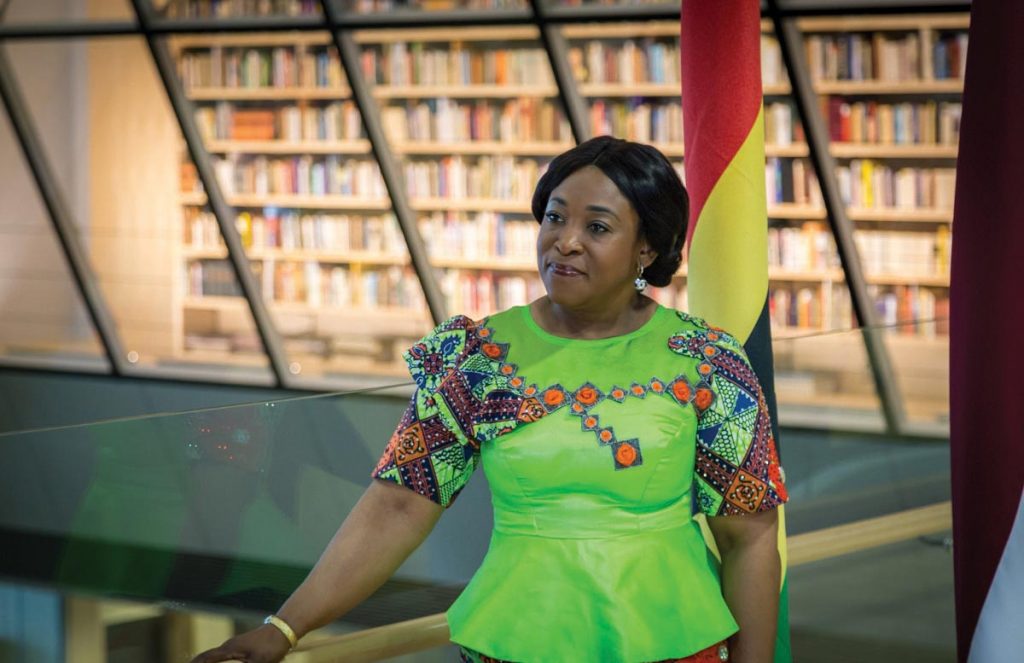
Last December, the story broke that the Ministry of Foreign Affairs and Regional Integration wanted to buy two properties to be used as embassy buildings in Oslo at an astronomical price of US$16.5 million, which caused a rumpus in Parliament when the opposition National Democratic Congress (NDC) announced that its investigations had shown that the price of the chancery building had been inflated by as much as US$8 million.
The main controversy surrounded the chancery building, located at No. 3 Sigyns Gate, opposite the popular Frogner Park in Oslo, which, according to the Ministry of Foreign Affairs, was on the market for 100 million Norwegian Kroner (NOK 100m). The associated costs – sales tax, agency fee, registration of documents, legal fees, and structural and evaluation report – were all also inflated, adding another NOK 5.18m to the asking price, and bringing the total price of the building to a cool NOK 105.18m (US$12.23m at the exchange rate equivalent at the time). According to the Ministry of Foreign Affairs, the ambassador’s residence was on the market for NOK 24.5m (US$2.85m), and adding the extra fees and taxes, that all came to a total NOK 25.77m (US$2.99m). Therefore, the total outlay for the two buildings added up to a staggering NOK 130.95m (US$15.28m).
As if that was not enough, the total cost for the transaction of these two buildings was then inflated again by US$1.28m without any justification whatsoever, bringing it to the grand sum of US$16.5m – and making this deal one of the craziest scams in Ghana’s history orchestrated by some top officials in government to rip off the entire nation.
In the beginning
In September last year, President Akufo-Addo informed the Norwegian prime minister, Erna Solberg, on the sidelines of the United Nations General Assembly in New York, of Ghana’s intention to open an embassy in Oslo. Ghana’s embassy in Denmark had for years represented the nation’s diplomatic interests in Norway, and in addition, it had an honorary consul in that Nordic country.
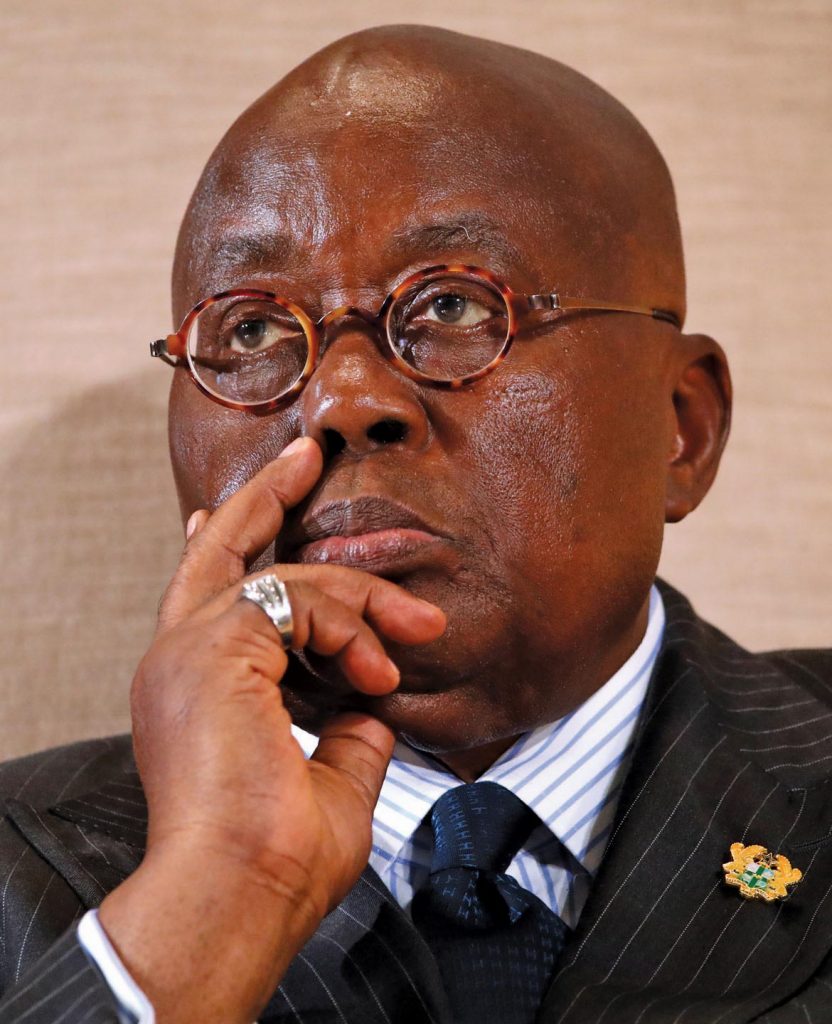
Foreign Minister, Shirley Ayorkor Botchwey, claimed that the reason for opening the embassy was the growing political and petroleum ties between the two countries. Norway is one of the oil giants of the world, and according to the minister, “there are over 50 Norwegian companies operating in [Ghana], including the investors of Apollonia City.”
This, however, raises the first of many questions, in this case of needfulness. If those 50 companies are already in Ghana, why does the country need an embassy in Oslo to look after companies that are already operating in Accra? It goes without saying that if the companies are all currently doing business in Ghana, it means the embassy in Denmark and the honorary consul in Oslo have already been effective in helping those Norwegian companies to decide to invest in Ghana. What more could a new embassy in Oslo offer that they are not already doing?
According to Ayorkor Botchwey: “It is worthy to note that Aker, a Norwegian oil and gas company, is investing an amount of US$20bn in Ghana – 50% of the amount has already been invested. In addition, the prime minister of Norway is co-chair of the
SDGs [United Nations Sustainable Development Goals] with the president, so engagements with Norway have intensified.”
That is like trying to say that every company willing to invest US$20bn in Ghana will get an embassy in its home country in return. Moreover, Ghana was already previously co-chair of the UN SDGs under ex-President John Mahama, who then relinquished his seat for President Akufo-Addo after the 2016 elections. So there really is no big deal about Akufo-Addo currently co-chairing the SDGs with the Norwegian prime minister as a reason to now warrant an embassy in Oslo.
The conspiracy begins
In July 2018, Foreign Minister Ayorkor Botchwey posted one of her close confidants, Regina Appiah-Sam, to a position at the Ghana Embassy in Denmark as head of chancery. Two months later, in September, the government announced its intention to open a full embassy in Oslo. Another month after that, in October, Ayorkor Botchwey directed that no person other than Appiah-Sam should go to Oslo and set up the embassy.
While in Oslo, Appiah-Sam rented a flat in the Bjørvika Apartments, at Schweigaards Gate 15B. With a flag of Ghana displayed somewhere in her flat and a picture of President Akufo-Addo hanging on a wall, Appiah-Sam then declared that the Ghana Embassy in Norway was officially open on November 27, 2018 – in her apartment.
“That lady [Regina Appiah-Sam] is a married woman and I hope the husband was not also living in the apartment,” a former Ghanaian diplomat, speaking on condition of anonymity, asked rhetorically, adding that “Ghana’s first president, the pan- Africanist Dr. Kwame Nkrumah, who was the nation’s first foreign minister, would be turning in his grave.”
“It was bizarre,” the former diplomat said, shaking his head in disbelief. “What was so urgent about this embassy that could not have waited for the proper facilities to be put in place before opening it, than to rush to set it up in an apartment?” There are speculations that the government must have known the owner of the property that the Ministry of Foreign Affairs tried to purchase for the chancery, before that person bought the property in 2017, and that there was some kind of tacit agreement between that person and the government to buy the property in 2017 and then sell it to the government in 2018 for an embassy, so that a percentage of the profit could go into the war chest of the ruling New Patriotic Party (NPP) to fight in the 2020 election. This is why the government was in such a rush to open the embassy in Oslo by any means necessary.
Just house-hunting?
In October 2018, Appiah-Sam was joined by a four-member team from Accra that included the director of estates and the director of finance to supposedly search for properties for use as the chancery and the ambassador’s residence, and the team stayed in Oslo for just about a week.
Prior to the visit by this team, Appiah-Sam was in touch with one Kristian Arvid Haug, a 67-year-old businessman who has ties to some key members of President Akufo-Addo’s family and who were shuttling between Accra and Oslo, through London, to meet Norwegian oil companies and had established business interests in the country. As such it is not by chance that Haug was at the center of the scandalous sale of the properties for the chancery and the ambassador’s residence for the hugely inflated price of US$16.5m to the Ghanaian government.
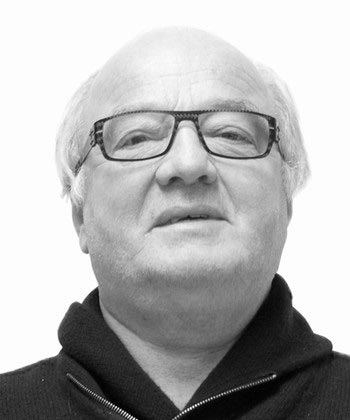
When Africawatch contacted Appiah-Sam to ask her questions about her role in this matter, particularly how she got to know Haug, she declined to comment. It is interesting to note that the chancery building at No. 3 Sigyns Gate – a 6- bedroom property – had been bought four years earlier, in the winter of 2014, by one Lillian Olsson for a mere NOK 25.25m (US$2.93m). After three years of occupancy, she sold it, in the middle of 2017, to Panonia AS for NOK 35.5m (US$4.13m). When property developer Age Ringdal took over Panonia AS after buying the majority shares in the company, he tried to renovate the property but poor health forced him to sell it in the winter of 2017 to an “unknown buyer” for NOK 31m (US$3.6m), losing NOK 4.5m (US$523,255).
Then the miracle of all miracles, when after just one year, that same property was now going to be purchased by Ghana’s Ministry of Foreign Affairs from Haug for as much as NOK 100m (US$11.62m) and the so-called “unknown owner” was going to make the tremendous profit of NOK 69m (US$8.02m) for just one year’s investment in the building – which is a price appreciation of 222 percent. And even more astonishing, at the time Ghana agreed to the sale in December 2018, no serious renovations had been done to the property to even begin to justify such an extraordinary level of value appreciation.
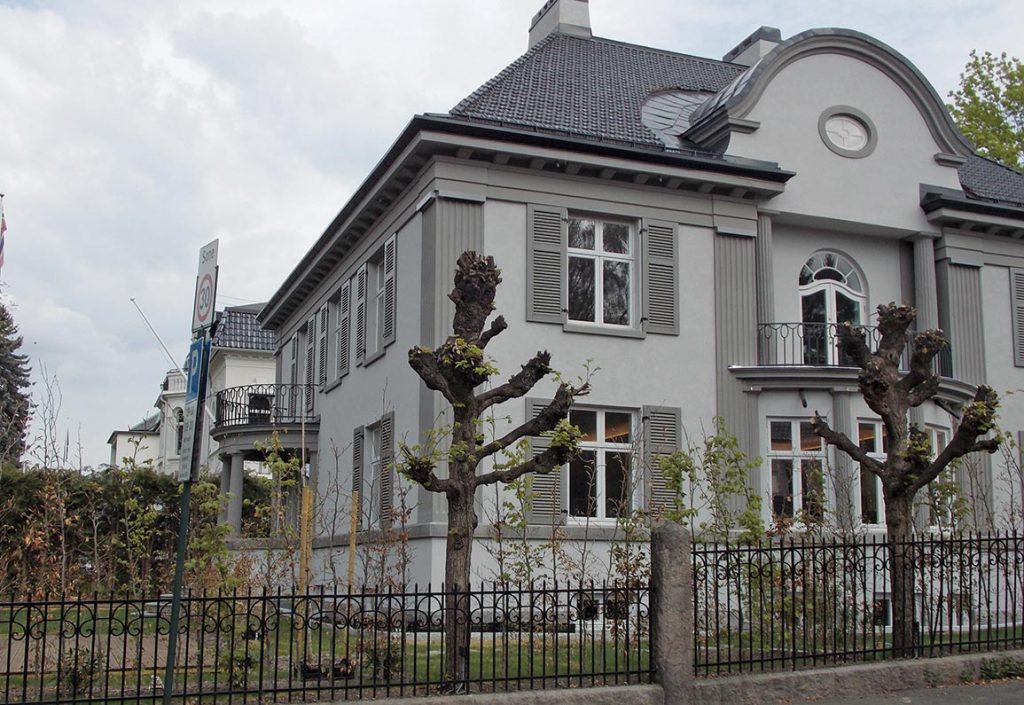
Even the director of estates at the Ministry of Foreign Affairs, Doris Brese, in one of her private text messages, which was leaked to Africawatch, described the asking price for No. 3 Sigyns Gate as “horrendously expensive,” and yet in the end she joined her colleagues at the Ministry to recommend that building for the chancery. This speaks bleak volumes about the behind-the-scenes pressures and political play that went on at the Ministry behind this outrageous property deal. Otherwise, how can one recommend a “horrendously expensive” building to be purchased by her government, for a chancery, when one knows full well that the price tag is not worth it? Either Brese is a hypocrite or she did not want to upset her superiors who were hell-bent on purchasing that very building no matter what.
“A scam”
Africawatch interviewed a seasoned real estate agent in Oslo, Michael Gareth Winnem, on the real estate market outlook and current trends in the Norwegian capital. He said the market had peaked in March 2017 and then went down 10-15 percent for used properties and was just starting to pick up again early this year, with prices appreciating between one and five percent. As to whether a property price appreciation of 222 percent is possible in Oslo’s market today, Winnem said “maybe if the building was bought 30 years ago, but for a property purchased in 2017, no, no, no, it is absolutely impossible, that would be a scam.”
Most tellingly, even though Ayorkor Botchwey claimed the Ministry of Foreign Affairs did “due diligence” on No. 3 Sigyns Gate, that due diligence did not reveal that the asking price was outrageous because there was already a conspiracy to steal from the state.
The Ministry of Foreign Affairs has said in a statement that “due diligence on the properties [was done] with the assistance of a property valuer and a reputable lawyer with expertise in acquisition of properties for diplomatic missions.” Ayorkor Botchwey even tried insisting in Parliament that the asking price was fair market value. “In fact, they [the five-member team of senior Ministry officials she sent to Oslo to look for accommodation for the embassy] came back with a property advance evaluation that is a public document in Norway,” Ayorkor Botchwey stated, while adding that “in the document, the property market is NOK 100 million. I have the document here.”
Africawatch then examined the document that Ayorkor Botchwey talked about in Parliament and realized that she was being deceitful. That document was an evaluation report on No. 3 Sigyns Gate conducted by one Jon Ugland on November 12, 2018. That appraisal was ordered by Nordisk Husprosjekt AS, the parent company of Jongsbru AS, that was selling the building on behalf of an unknown person to Ghana.
And here comes the kicker: Haug owns 50 percent of the shares in Husprosjekt AS and he is also the chairman of the board of Jongsbru AS. This then raises another important question about who is it that would go to buy a property and take an appraisal ordered by and conducted for the seller at face value? The Ministry of Foreign Affairs claims to have had a property valuer, so what prevented it from arranging its own independent appraisal of the building to verify the asking price? In the evaluation report that Ayorkor Botchwey took to Parliament, the identity of the real owner remained hidden. It only listed Panonia AS, a company that sold the property in 2017, as the titleholder, in order to cover up the actual owner. Strangely, the Ministry either could not detect this obvious anomaly or it chose to turn a blind eye to it because those officials were doing the bidding of the government to see the deal through quickly at any cost.
After the sale was aborted following the media storm and public outcry, new documents on No. 3 Sigyns Gate now reveal that Haug has changed the titleholder from Panonia AS to his own company, Nordisk Husprosjekt AS – an indication that he was just a front, and speculations are that Haug was doing so for his friends from the president’s family.
That is why the Ministry was preparing to pay the full price and close the deal by the end of December 2018 until a Norwegian newspaper, Finansavisen, published a story on December 12, stating that the price of the property at No. 3 Sigyns Gate had been inflated to an “unethical” level. This prompted the keen-eyed opposition MP, Samuel Okudzeto Ablakwa, to raise a rumpus in Parliament, which forced the foreign minister to halt the purchases.
On February 1, President Akufo-Addo appointed Jennifer Lartey as the first ambassador from Ghana to Norway. On March 7, she presented her letters of accreditation to the Norwegian king, His Majesty King Harald V. Currently the ambassador and her staff are operating from a rented space on the 5th floor at Akersgata 1, and Appiah-Sam has since returned to her base in Copenhagen.
Open deception
In all this, Ayorkor Botchwey has been very evasive and her statements have continued to be vague, all of which suggest that there is much she is covering up. When she appeared in Parliament on December 17 and informed the House about the embassy, she only said: “Mr. Speaker, also, we would open a resident diplomatic mission in Oslo …” Not one word more. Thus, but for Okudzeto Ablakwa’s spirited and patriotic intervention, the Ministry would have gotten away with a colossal public fraud.
In fact, Ayorkor Botchwey actually finished her presentation on this note: “Mr. Speaker, I believe I have covered everything. At the end of the submissions of Hon. Members, I would make a few comments if there are any issues that I would need to respond to.”
Her definition of “everything” did not include the “unethical” inflation on the prices of the Oslo properties, nor the Finansavisen report, which had been brought to her attention five days earlier by the chairman of the Parliamentary Foreign Affairs Committee, Frank Annoh-Dompreh, who is the NPP MP for Nsawam Adoagyiri. Indeed it was Okudzeto Ablakwa’s intervention that changed everything, forcing Ayorkor Botchwey to concede later that she had in fact asked her officials to stop the process of purchasing the Oslo properties after the chairman of the Foreign Affairs Committee had drawn her attention to the Finansavisen story of December 12 about the suspicious inflation of those prices.
On the same day, December 12, 2018, the chairman of the Parliamentary Foreign Affairs Committee wrote to Ayorkor Botchwey, stating that “the committee has raised some concerns relating to the acquisition of properties amounting to $16.5 million for the mission in Oslo. To enable Members to appreciate the nature and form of these purchases, it would be appreciated if the Ministry could furnish the committee with the following documents relating to the proposed property for the Mission in Oslo: (i) valuation report on the properties, (ii) the ownership of the properties and exact locations, (iii) purchase agreement/contract of purchase.” Last month Annoh-Dompreh told Africawatch that his committee had yet to receive a response from the foreign minister, and as such he had no idea of what was going on regarding the Oslo matter.
This whole situation remains shrouded in layers of secrecy. The Ministry claims that the five-member team of officials who were sent to Oslo to look for accommodation for the embassy came back to report that Oslo was “extremely expensive”, and among the three properties they saw, the team recommended for the chancery No. 3 Sigyns Gate, a 100-year-old building, “in view of its location, accessibility, structure, size, parking lots, among others.”
Interestingly, Oslo becomes “extremely expensive” only when Ghana decides to buy a property there as No. 3 Sigyns Gate was actually listed for NOK 40m (US$4.65m) on the internet in December 2018. But as soon as Ghana expressed interest in the property, it was taken off the internet and the asking price shot up drastically to US$12.23m.
The foreign minister would not disclose the exact location of the other two properties she claimed the team had viewed, thus making it impossible for any proper verification.
Africawatch has also discovered that some offers of properties with equally good “location, accessibility, structure, size, parking lots” and costing far less than US$13m were sent to Appiah-Sam for consideration by the search team, but they did not even bother to check them out. One such property is at Inkognitogata 12, an attractive and imposing building just behind the palace of His Majesty King Harald V and on the same street with some foreign embassies, with an asking price that was just NOK 22.5m (US$2.62m). But Appiah-Sam and the search team deliberately did not even take a look at it, because the so-called search for suitable properties was obviously just a mere formality as the Ministry had long been influenced by the powers that be to settle on No. 3 Sigyns Gate for the chancery purchase. Regarding the location of the property for the ambassador’s residence, all that the foreign minister said was “the team also recommended the purchase of a property they identified in Ullern costing approximately $3.5m.”
Again, she was not specific enough at all. Though the purchase of that property was also aborted, its address is a top-guarded secret at the Ministry. But some people suspect that it is Hoffsjef Løvenskiolds vei 69B in the Ullern section of Oslo, a residential building which serves as the mailing address for Haug’s Nordisk Husprosjekt AS and Jongsbru AS companies, and the value of that compact house is nowhere near the asking price of US$3.5 million.
Deputy Foreign Minister Mohammad Habibu Tijani told Africawatch that the Ministry was now also renting accommodation for the ambassador’s residence.
Lying through their teeth
By analyzing the foreign minister’s denials, distilling facts from the documents on the abortive sale, and talking to one of the principals involved in the deal, Africawatch has uncovered that Ayorkor Botchwey lied through her teeth when she told the nation that the Ministry had only “expressed interest” in the Oslo properties and that “there was no acceptance on any offer.” The Ministry had, in fact, already firmly committed itself and for all intents agreed to purchase No. 3 Sigyns Gate for the chancery.
In fact, her insistence that the Ministry had not made any “commitment” to purchase the properties was a total outright lie.
For example, if the Ministry had not already made a commitment to buy the properties, then why did it state as part of its “commitments to be paid in 2018” from a US$50m loan granted by the Societe Generale, the “purchase of chancery and residency” in Oslo to the tune of US$16.5m?
If Okudzeto Ablakwa had not intervened, Parliament would not have known anything regarding this matter on December 17. The minister would have gone on her merry way, and No. 3 Sigyns Gate would have been fully paid for by the people of Ghana in two weeks’ time – at the scandalous cost of US$12.23m.
The US$50m Societe Generale loan was negotiated in 2016 by the former NDC minister of foreign affairs, Hannah Tetteh, and that money was slated for the opening, construction, and renovation of Ghana’s embassies abroad. The loan has an 8.4% interest rate and a repayment period of six years. The bank gave the government up to December 2017 to utilize the loan, but later extended the use-by date to December 2019.
When the government changed hands in January 2017, the new Akufo-Addo administration decided to hurry the utilization of the loan in order to meet that use- by date. Therefore, the Ministry of Foreign Affairs under Ayorkor Botchwey drew up a list of Ghana’s missions abroad that needed renovations or newly constructed buildings, as well as the opening of new embassies and consulates. The costs of all the other purchases and constructions on the Ministry’s list seemed reasonable, except Oslo, which is why it became such a big issue last December. And one does not disburse such a loan based on mere offers but only upon commitments, as the Ministry’s summary of disbursement rightly indicated. So the Ministry had really gone beyond an “offer” to the understanding of “agreement” in order to purchase those properties.
Additionally, according to a document stating the “terms for purchase” for No. 3 Sigyns Gate, now in the possession of Africawatch, the Ministry asked Haug’s Jongsbru AS for the following renovations to be done: “(a) The small wall on the second floor of the ambassador’s office shall be removed and the electric installations shall be installed on the inside of the wall with an opening of 30×30 cm. (b) Cables which cannot be removed in the opening shall be placed in boxes. (c) In the office on the ground floor, there shall be installed two toilets as shown in the drawing. (d) Wardrobe in the entrance shall be completed and ready to use. (e) The seller shall install a kitchen in the bedsitting room in the basement.” It is a fact of real estate business that a buyer cannot ask for specific renovations to be done without having first firmly agreed to buy the property. This makes the strident assertions by Ayorkor Botchwey that the Ministry had not made any commitment whatsoever to purchase the property absurd.
The document clearly states that: “The property shall be taken over and the purchase price paid by 31.12.2018. If desired, the seller may defer the transfer to 02.01.19.”
Furthermore, that document asked the seller to apply to the Oslo municipality for permission to change the property from residential to embassy and “a purchase agreement shall be concluded based on the standard contract for purchase of real estate from the real estate agency business Sem & Johnsen.” Last month, Africawatch had an exclusive interview right inside No. 3 Sigyns Gate in Oslo with the real estate broker for the property, Jan Fredrik Bonde, who works for Sem & Johnsen.
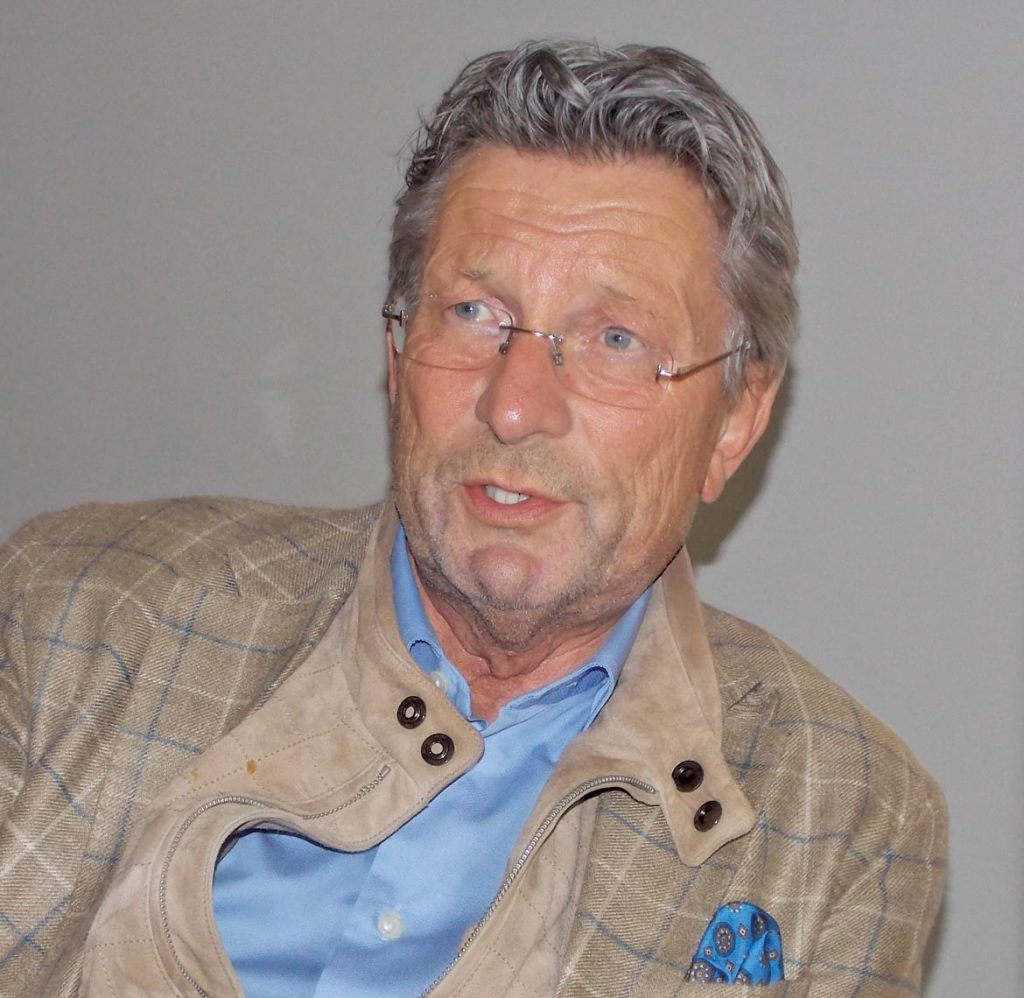
Africawatch asked him directly if the government of Ghana had actually agreed to buy No. 3 Sigyns Gate for NOK 100m. Bonde’s answer was emphatic. “Yeah,” he responded, and revealed that not only did Ghana agree to purchase the property but it also gave the seller authorization to change the status of the building from residential to an embassy at the Oslo municipality.
Asked if Ghana had backed out of the agreement because the asking price was too high, Bonde stated: “No, I don’t think so.” And when pressed further, he said “you better ask them [Ghana].”
From Bonde’s interview (see extracts on page 19), one does not need the mind of a prosecuting attorney to deduce that Ayorkor Botchwey and her boss, President Akufo-Addo, who defended her actions, had deliberately chosen to lie to the nation about the purchase of the Oslo embassy buildings. And as they say in Ghana, “when a big man lies, it means he is hiding something big.” Unlike Ayorkor Botchwey and her Ministry and government, Bonde has nothing to gain by lying. So his words can be trusted. Yes, he would have gotten a large commission from the sale, but as the sale has fallen through, there is no advantage for him to lie about the whole matter. So Ghana, as a nation, can trust his words. And his words are simple: Ghana “agreed”, not “offered to buy”, No. 3 Sigyns Gate at the hugely inflated asking price. His revelations bring no grace at all to Ayorkor Botchwey and all who supported her assertions last December, including President Akufo-Addo.
More falsehoods
When the scandal hit the headlines in December, construction was going on to change No. 3 Sigyns Gate into an embassy. With photos of the construction now splashed in the media, Ayorkor Botchwey offered another lie to deceive the people of Ghana. “I wish to state on record that prior to the Foreign Affairs team’s arrival in Oslo, the proposed chancery building was already under renovation, and was not being done at the instance of the Ministry,” Ayorkor Botchwey stated. “The said building was initially an office and later converted into a residence. The ongoing renovation is to restore the building back to an office complex.”
Just how did Ayorkor Botchwey and the Ministry know that the renovation was to “restore the building back to an office complex”? Because they were the ones who had requested it. When they were forced to pull out of the agreement, there was then no need to turn the building into an office so it has remained as residential. When Africawatch visited No. 3 Sigyns Gate in May 2019, the building had been fully renovated and was still residential, not “an office complex.”
Bonde, the real estate broker for the property, told Africawatch that the renovations cost NOK 35m (US$4.07m), and that the building has been put back on the market for the same asking price of NOK 100 million, apparently to somehow save face for the Ghanaian government. But even with all the renovations, some real estate agents in Oslo said the price is still not realistic.
Yet even in this extreme case, Akufo-Addo’s government still wheeled out its big propagandists to massage their message and deceive Ghanaians further by claiming that there was nothing wrong with these Oslo purchases. Each time they did that, they were rudely throwing sand into the eyes of unsuspecting Ghanaians.
For example, Abdul Malik Kweku Baako, editor of the Accra-based Crusading Guide newspaper, who has firmly nailed his mast to the NPP government’s sail, tried to use basic sophistry to get the government off the hook by claiming that Ayorkor Botchwey and her Ministry could not be faulted for the price of the property.
“I think the price for the facility is in order because it will become our property,” Baako said, implying that paying US$8m over and above the market value price was simply no problem at all.
Baako also created the impression that Norway had “proper systems for determining the cost of property, unlike Ghana where arbitrary prices are set without any checks. The $12 million for the [chancery] and another $3 million for the residence of the ambassador were not set by the seller but independent valuers … it is not a question of somebody asking another person to inflate the figures so that we can have a cut … you can’t do it without being caught.”
That was completely untrue!
Winnem, who has several years of experience working in the real estate market in Oslo, told Africawatch that in Norway the price of a property “is the prerogative of the seller” and only a seller of a property sets the price, not any valuers. He explained that the seller’s broker or valuer may examine the property and suggest a price, but the seller is at liberty to accept or reject their suggestions. Therefore, there are no independent valuers who set the price for sellers in Norway as Baako has claimed.
Winnen said the first thing a buyer must ask is this: “Am I paying for the real value of the property?” and if possible, the buyer should send his or her own valuer to ascertain if the property is worth the seller’s asking price – something the Ministry of Foreign Affairs apparently did not care to do. If Okudzeto Ablakwa had not intervened to bring this scandal to light, the Ministry (and by extension, the government) would have gotten away with an US$8 million scam, and the illicit cut would have gone into individual and ruling party coffers, and nobody would have been caught.
President defends the indefensible
Taking all the evidence together, President Akufo-Addo clearly got it wrong when he dismissed out of hand the NDC and the public’s concerns over the abortive Oslo purchases.
Commenting on Okudzeto Ablakwa’s revelations in Parliament that showed the asking price of No. 3 Sigyns Gate was “outrageously high and outlandishly inflated,” as well as Okudzeto Ablakwa’s call on the president to institute a Commission of Inquiry to investigate the matter, Akufo-Addo told journalists in Accra on December 19 that since his government came into office, “so many allegations have been thrown against transactions, against personalities of this government – a lot of the time, on the flimsiest of evidence. Here is an allegation being made [against] a transaction that has not even taken place, and yet a serious accusation of misappropriation, mishandling of public fund is made.”
President Akufo-Addo then went on: “When you have allegations that are so empty of substance and then you say that merely because it has been made you will, therefore, want an independent inquiry, I am not going to buy that. “Clearly, it is the pattern of the opposition. Throw these accusations in the air, when they are debunked, we don’t hear anything about it and they just move on to the next allegation. That’s what we have seen.”
As Africawatch has clearly proven in this article, those allegations against the aborted purchases of the Oslo embassy buildings are credible and very serious. And these accusations have not been made on the “flimsiest of evidence” as the president has claimed. For Ayorkor Botchwey to cancel such a huge purchase because of such “evidence” means that the evidence was not weak, let alone the “flimsiest”. Ghana came very close to suffering a massive loss of state funds if Okudzeto Ablakwa had not intervened.
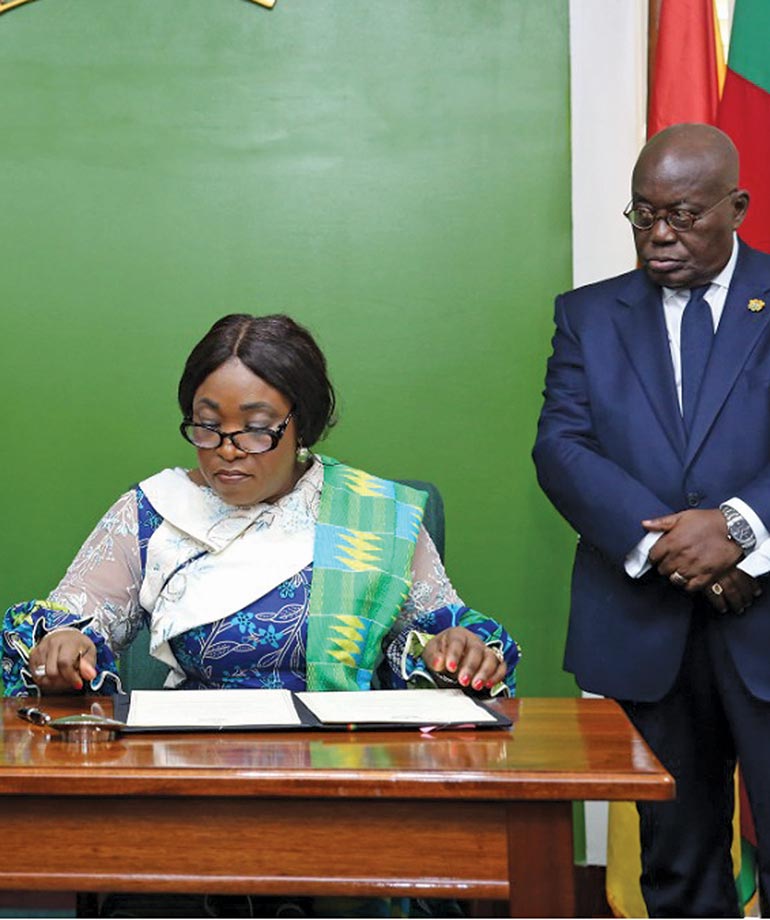
This was a clear case of a conspiracy to steal from the state, and why President Akufo-Addo would not set up an independent inquiry to probe it raises suspicions that the president knew and still knows more about this enormous financial scam. It is now being speculated that some key members of his family masterminded the whole plot. Otherwise why would he be defending such an indefensible act? Perhaps this was the point Mary Addah, the program officer of the Ghana Integrity Initiative (GII), put across so accurately when she said it was “worrying” that the president did not take seriously the concerns over the abortive Oslo purchases, and Africawatch agrees that it “was very unfortunate”, as Mary Addah stated, “because the President’s posture over time has been that of consistency in encouraging public institutions to take up the mantle of investigating issues when they come up.” “So if the President turns the wheels and he is now saying there is no need for these investigations to happen, then it becomes worrying, worrying to civil society and to the people of Ghana who have given him the mandate to ensure that we have a society that is devoid of corruption,” Addah added.
A secret mission to Oslo
Surprisingly, on December 20, three days after Foreign Minister Ayorkor Botchwey had told Parliament that she “would not superintend over any acts of corruption, wrongdoing, outrageous inflation of figures or fraudulent activities that would end in the loss of funds to the Ministry and, by extension, to the state”, and a day after President Akufo-Addo had dismissed the allegations as lacking substance, Peter Nyarko Opata, the director general of the Research Department of the Ministry of Foreign Affairs, dispatched one Priscilla Ankomah, who is stationed at the Ghana Embassy in Denmark, to travel to Oslo and look into the matter, ostensibly to help the government cover up this scam.
When Africawatch tracked down some of the people that Ankomah made contact with in the Norwegian capital, they stated that she had asked them not to let anybody know that she was in Oslo because she was on a “secret mission.” The questions Ankomah was quietly asking around in Oslo suggest that she was directed to find out what people knew about the real owners of the buildings proposed for the chancery and the ambassador’s residence, and why they thought the asking price had been increased to such an astronomical level. She was also trying to see if a copy of a purchase agreement was out there somewhere, and if anybody knew of any payments that had been made in the deal. Additionally, Ankomah was gauging the reaction of the Ghanaian community and Norwegian government to this very embarrassing situation.
It seems clear at this point that Opata and his Research Department were trying to assess how much information and what documents regarding the deal were already out in Oslo, all in an attempt to help the government do damage control and cover up this shameful scandal.
That “secret mission” to Oslo can suggest only one thing: President Akufo-Addo and his foreign minister, Ayorkor Botchwey, have not been telling the truth and are hiding something big in this bizarre scandal.
Conclusion
The government thought it had gotten away with the scam – six months after the news of it broke – but as Africawatch’s investigation has shown, Foreign Minister Ayorkor Botchwey and her Ministry still have a serious situation to try and explain to the public.
After all is said and done, this is clearly a terrible case of a conspiracy by some top officials in government to steal from the state, with a large cut going into their political party coffers and the pockets of some members of the president’s family – pure and simple. And it was carried out with a disastrous sense of greed and entitlement, as if such actions were normal, and would have no consequences. Lying to the nation to cover up atrocious schemes in such a conspiracy to steal must not be made so easy that responsible public officials would ever consider indulging in it with impunity. Such corruption must carry a heavy price if the integrity of the nation and the sanctity of its democracy are to be protected.